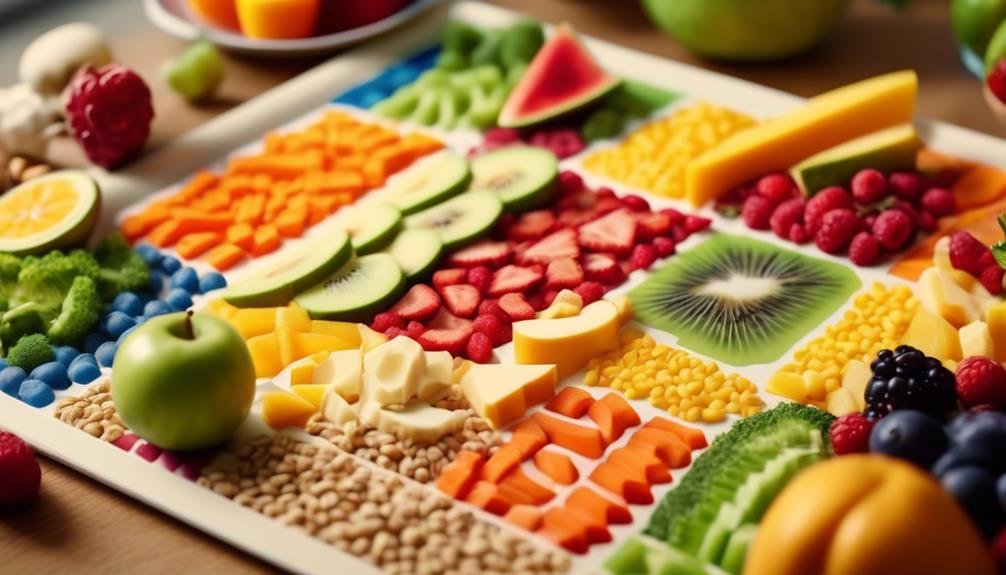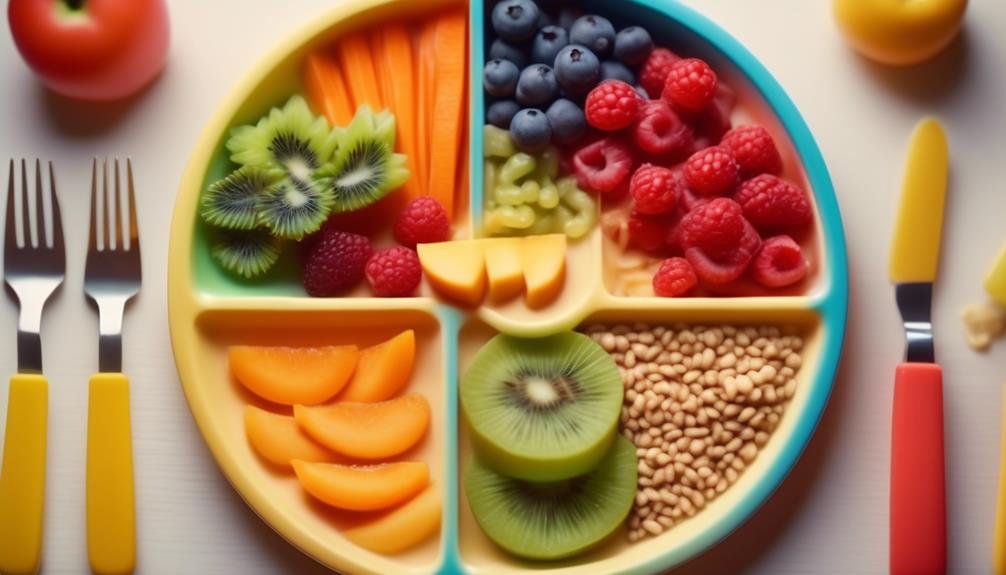"Cherishing Little Steps - A Haven for Baby and Family Journeys"
Balanced Diets for Toddlers
Are you struggling to provide your toddler with a balanced diet? In a world filled with convenient yet unhealthy options, it can be challenging to ensure your little one is getting all the nutrients they need for optimal growth and development.
But fear not, because we're here to guide you through the maze of toddler nutrition and offer practical tips to help you make informed choices.
From understanding their nutritional needs to dealing with picky eaters, this discussion will equip you with the knowledge and strategies you need to set your toddler on the path towards a healthy and balanced diet.
So, let's dive in and discover the key ingredients for nourishing your little one!
Key Takeaways
- Limit processed foods and opt for fresh, whole foods to prevent health issues like obesity, diabetes, and heart disease
- Caregivers play a critical role in promoting balanced diets by offering a variety of nutritious foods, modeling healthy eating habits, and involving toddlers in meal planning and preparation
- A balanced diet for toddlers provides necessary nutrients for growth and development, supports a healthy immune system, promotes cognitive development, and reduces the risk of chronic diseases later in life
- Introducing diverse food groups to toddlers can be done by incorporating new foods into familiar dishes, involving them in the preparation process, and exposing them to a variety of flavors, textures, and tastes.
The Importance of Balanced Toddler Diets

Ensuring that your toddler has a balanced diet is crucial for their overall health and development. It's important to understand the impact of processed foods on their diets and the role that caregivers play in promoting balanced eating habits.
Processed foods, such as fast food, sugary snacks, and packaged meals, can have a negative impact on your toddler's diet. These foods are often high in salt, sugar, and unhealthy fats, which can lead to a variety of health issues, including obesity, diabetes, and heart disease. By limiting the consumption of processed foods and opting for fresh, whole foods, you can help provide your child with the nutrients they need for optimal growth and development.
As a caregiver, you play a vital role in promoting balanced diets for your toddler. By offering a variety of nutritious foods, such as fruits, vegetables, whole grains, lean proteins, and dairy products, you can help ensure that your child receives the necessary vitamins, minerals, and nutrients for their growing bodies. Additionally, modeling healthy eating habits and involving your toddler in meal planning and preparation can help foster a positive relationship with food and encourage them to make healthy choices.
Nutritional Needs for Growing Toddlers
To meet the nutritional needs of growing toddlers, it's important to provide a variety of nutrient-rich foods in their diets. Toddlers have unique nutritional challenges as they transition from infancy to childhood. Here are some mealtime strategies to ensure they get the nutrients they need:
- Offer a balanced mix of food groups: Include fruits, vegetables, whole grains, lean proteins, and dairy products in your toddler's meals. This helps provide a wide range of vitamins, minerals, and essential nutrients.
- Encourage self-feeding: Allowing toddlers to feed themselves helps develop their motor skills and encourages independence. Offer age-appropriate finger foods and utensils to make mealtime more engaging.
- Be patient with picky eaters: Toddlers often go through a phase of picky eating, which can make meeting their nutritional needs challenging. Offer a variety of foods and continue to expose them to new flavors and textures. It may take several attempts before they accept new foods.
Introducing Diverse Food Groups to Toddlers

Introduce a variety of nutrient-rich food groups to your toddler's diet for optimal growth and development. It is important to expose your child to a wide range of flavors, textures, and tastes from an early age. This will help them develop a diverse palate and encourage healthy eating habits in the long run.
One effective way to introduce new foods is by incorporating them into familiar dishes. For example, you can add finely chopped vegetables to pasta or mix fruits into yogurt. This allows your toddler to explore new flavors while still enjoying their favorite meals. It is also helpful to involve them in the preparation process, such as letting them choose a vegetable at the grocery store or helping with simple tasks in the kitchen. This encourages independent eating habits and makes mealtime more enjoyable for both of you.
To further assist you in providing a balanced diet for your toddler, here is a table outlining the different food groups and some examples of each:
| Food Group | Examples |
|---|---|
| Fruits | Apples, bananas, oranges |
| Vegetables | Carrots, broccoli, peas |
| Grains | Rice, bread, oats |
| Proteins | Chicken, beans, tofu |
| Dairy | Milk, cheese, yogurt |
Remember that every child is unique, and it may take some time for them to accept new foods. Be patient and continue offering a variety of options to help them develop healthy eating habits.
Essential Vitamins and Minerals for Toddlers
One way to ensure your toddler receives the essential vitamins and minerals they need is by incorporating a variety of nutrient-rich foods into their diet. Here are three key vitamins and minerals that play a crucial role in your toddler's growth and development:
- Vitamin D: This vitamin is essential for the absorption of calcium, which is necessary for strong bones and teeth. Exposure to sunlight is the best source of vitamin D, but it can also be found in fortified milk, fatty fish, and egg yolks.
- Iron: Iron is vital for the production of hemoglobin, a protein that carries oxygen to the cells in the body. Good sources of iron include lean meats, fortified cereals, beans, and spinach.
- Calcium: Calcium is crucial for building strong bones and teeth, as well as for proper muscle and nerve function. Dairy products like milk, cheese, and yogurt are excellent sources of calcium, but it can also be found in leafy green vegetables and fortified plant-based milk alternatives.
While a balanced diet is usually sufficient to meet your toddler's vitamin and mineral needs, sometimes vitamin deficiencies may occur. In such cases, your pediatrician may recommend mineral supplements to ensure your child gets the necessary nutrients for their overall health and development. Remember to consult with a healthcare professional before starting any supplements.
Incorporating Protein Into Your Toddler's Diet

In order to continue supporting your toddler's growth and development, it's important to incorporate protein into their diet. Protein plays a crucial role in building and repairing tissues, supporting a healthy immune system, and providing energy. While many people associate protein with meat, there are alternative protein sources that can be beneficial for your toddler, especially if you're considering a vegetarian diet.
Benefits of vegetarian diets for toddlers
Vegetarian diets can offer several benefits for toddlers. They're typically rich in fruits, vegetables, whole grains, and legumes, which provide essential nutrients and fiber. Additionally, vegetarian diets can be lower in saturated fats and cholesterol, supporting heart health. However, it's important to ensure that your toddler's vegetarian diet includes enough protein to meet their needs.
Alternative protein sources for toddlers
If you're exploring vegetarian options for your toddler's protein intake, there are plenty of alternatives to meat. Legumes such as lentils, chickpeas, and beans are excellent sources of protein. Tofu, tempeh, and edamame are also good options, providing not only protein but also essential minerals like iron and calcium. Additionally, dairy products like milk, yogurt, and cheese can be included in a vegetarian diet to ensure adequate protein intake.
Healthy Fats for Brain Development in Toddlers
Including healthy fats in your toddler's diet is essential for optimal brain development. The brain is made up of nearly 60% fat, and it requires a steady supply of healthy fats to function properly. Here are three reasons why healthy fats are crucial for your toddler's brain development:
- Improved cognitive function: Healthy fats, such as omega-3 fatty acids found in fatty fish like salmon and sardines, have been shown to improve cognitive function in children. These fats help build and maintain the structure of brain cells, enhance communication between brain cells, and support overall brain health.
- Enhanced memory and learning: Studies have found that children who consume higher amounts of healthy fats have better memory and learning abilities. This is because healthy fats support the growth and development of the hippocampus, a brain region responsible for memory and learning.
- Better mood regulation: Healthy fats play a role in regulating mood and emotions. Omega-3 fatty acids, in particular, have been linked to reduced symptoms of depression and anxiety in children. Including sources of healthy fats in your toddler's diet, such as avocados, nuts, and olive oil, can help promote emotional well-being.
To ensure your toddler receives adequate healthy fats for brain development, incorporate a variety of foods rich in omega-3 fatty acids, such as fatty fish, chia seeds, and flaxseeds, into their diet. Additionally, use healthy oils like olive oil or coconut oil for cooking and preparing meals.
Managing Portion Sizes for Toddlers

To ensure your toddler's balanced diet, it's crucial to manage portion sizes effectively. This helps to provide them with the right amount of nutrients without overfeeding. As a parent, you play a vital role in shaping your child's eating habits and establishing healthy portion control from an early age.
When managing portion sizes for toddlers, it's important to remember that their stomachs are still small. Start by serving small portions and allowing them to ask for more if they're still hungry. This teaches them to listen to their body's hunger and fullness cues.
Introducing new flavors can also help in managing portion sizes. Offering a variety of foods not only exposes your toddler to different tastes and textures, but it also prevents them from getting bored with their meals. It's a good idea to introduce new flavors gradually and in small amounts, giving your toddler a chance to develop a taste for them.
Sneaky Ways to Add Vegetables to Toddler Meals
One effective strategy for increasing vegetable intake in toddler meals is by incorporating them into familiar dishes. By sneaking vegetables into your toddler's favorite meals, you can ensure that they're getting the necessary nutrients without them even noticing.
Here are three creative meal ideas to help you achieve this:
- Veggie-packed pasta sauce: Blend cooked vegetables like carrots, spinach, and zucchini into a tomato-based pasta sauce. The vibrant colors will go unnoticed, but the added nutrients will be beneficial for your toddler's growth and development.
- Hidden vegetable smoothies: Sneak a handful of spinach or kale into your toddler's favorite fruit smoothie. The sweetness of the fruits will mask the taste of the vegetables, making it a delicious and nutritious drink.
- Cauliflower mac and cheese: Replace some of the pasta in your toddler's mac and cheese with steamed and mashed cauliflower. The creamy cheese sauce will hide the cauliflower, providing an extra serving of vegetables in a dish they already love.
Choosing the Right Carbohydrates for Toddlers

Choosing the right carbohydrates for your toddler's diet is essential for their overall health and well-being. As your little one continues to grow and develop, providing them with the right balance of carbohydrates is crucial. While carbohydrates are an important source of energy, it's important to choose the right types for your toddler.
When it comes to carbohydrates, opting for whole grains is a great choice. Whole grain cereals, bread, and pasta are packed with fiber, vitamins, and minerals that are essential for your toddler's growth. Additionally, these foods have a lower glycemic index, meaning that they release sugar into the bloodstream more slowly, providing a steady source of energy.
Alternative carbohydrate sources for toddlers include fruits and vegetables. These aren't only rich in carbohydrates but also provide a wide range of nutrients. Fruits like bananas, apples, and berries are excellent choices, while vegetables like sweet potatoes, peas, and carrots are packed with vitamins and minerals.
It is important to note that excessive carbohydrate intake can have negative effects on your toddler's health. Too many refined carbohydrates, such as sugary snacks and drinks, can lead to weight gain and an increased risk of developing chronic conditions like diabetes. Aim for a balanced approach by including a variety of carbohydrates in your toddler's diet and limiting their intake of refined sugars.
Hydration Tips for Toddlers
As you continue to prioritize your toddler's health and well-being, ensuring proper hydration is essential. Hydration plays a crucial role in maintaining your little one's overall health and promoting optimal growth and development.
Here are three hydration tips for toddlers that will help you ensure they stay adequately hydrated:
- Offer water frequently: Encourage your toddler to drink water throughout the day. Keep a sippy cup or water bottle within their reach, and offer water with meals and snacks. Water is the best choice for hydration as it's free of sugar and additives.
- Monitor urine color: Pay attention to the color of your toddler's urine. A pale yellow color indicates proper hydration, while a darker shade may suggest dehydration. Encourage your child to drink more water if their urine appears dark.
- Include hydrating foods: Apart from water, you can also include hydrating foods in your toddler's diet. Fruits like watermelon, oranges, and strawberries are high in water content and can contribute to their overall hydration.
Benefits of drinking water for toddlers include regulating body temperature, aiding digestion, preventing constipation, and supporting cognitive function.
Dealing With Picky Eaters: Strategies and Solutions

To address picky eaters, there are effective strategies and solutions that can help improve your toddler's eating habits. Mealtime battles can be frustrating, but by implementing these strategies, you can overcome them and ensure your child receives a balanced diet. Here are some proven strategies for dealing with picky eaters:
| Strategies | Description | Examples |
|---|---|---|
| Offer a variety of foods | Introduce different flavors and textures to expand your toddler's palate | Serve a mix of fruits, vegetables, proteins, and grains |
| Involve your toddler in meal planning | Let your child choose from a selection of healthy options | Ask them to pick between broccoli and carrots for dinner |
| Be a role model | Show your child that you enjoy a wide range of nutritious foods | Let them see you eating and enjoying vegetables |
| Make mealtimes fun | Use colorful plates and utensils, play soothing music, or tell stories | Create a positive and enjoyable atmosphere |
| Stick to a routine | Establish regular meal and snack times to help your toddler develop healthy eating habits | Offer meals and snacks at consistent times each day |
Creating a Meal Plan for Balanced Toddler Diets
Now let's focus on ensuring that your toddler receives a balanced diet by creating a meal plan that meets their nutritional needs. Meal prep is an essential part of providing balanced meals for your little one. By planning ahead and preparing meals in advance, you can save time and ensure that your toddler's meals are nutritious.
Consider these three tips when creating a meal plan:
- Variety is key: Include a variety of foods from different food groups to ensure that your toddler gets a wide range of nutrients. Include fruits, vegetables, whole grains, lean proteins, and dairy products in their meals.
- Cater to food allergies: If your toddler has any food allergies, it's crucial to be mindful of these when creating their meal plan. Make sure to choose alternative ingredients and find suitable substitutes to ensure they still get all the necessary nutrients.
- Balance each meal: Each meal should contain a balance of carbohydrates, proteins, and fats. Aim for a combination of whole grains, lean meats or plant-based proteins, and healthy fats like avocados or nuts. This will help keep your toddler energized and satisfied throughout the day.
Frequently Asked Questions
How Can I Encourage My Toddler to Eat Vegetables if They Are a Picky Eater?
To encourage your picky eater toddler to eat vegetables, try these strategies: offer a variety of options, involve them in meal preparation, be a role model by eating veggies yourself, and make it fun and exciting.
What Are Some Healthy Fats That Can Aid in Brain Development for Toddlers?
You want your toddler's brain to develop well, right? Well, one way to do that is by including healthy fats in their diet. Omega-3 fatty acids are especially important for brain development in toddlers.
How Should I Manage Portion Sizes for My Toddler?
When managing portion sizes for your toddler, it's important to consider their age and appetite. Offer a variety of nutritious foods and let them decide how much to eat. For picky eaters, be patient and keep introducing new foods.
What Are Some Sneaky Ways to Incorporate Vegetables Into My Toddler's Meals?
You can get creative with vegetable recipes for toddlers. Try making veggie-packed muffins or blending veggies into pasta sauces. Fun ways to present vegetables to picky eaters include making veggie faces on pizzas or cutting them into fun shapes.
Can You Provide Tips on Creating a Balanced Meal Plan for My Toddler's Diet?
To create a balanced meal plan for your toddler, focus on offering a variety of foods from each food group. Encourage them to eat vegetables by incorporating them into different dishes and making mealtime fun.
Conclusion
In conclusion, providing balanced diets for toddlers is crucial for their growth and development. By introducing diverse food groups and incorporating essential vitamins, minerals, protein, and carbohydrates, we can ensure that toddlers receive the necessary nutrients.
For example, a case study showed that a toddler who regularly consumed a variety of fruits, vegetables, lean proteins, and whole grains experienced improved cognitive function and sustained energy levels throughout the day.
By following these principles, we can help toddlers establish healthy eating habits that will benefit them in the long run.

